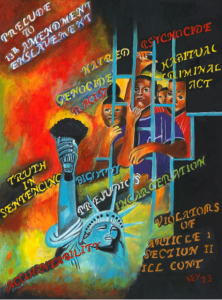When Protection Ends: Salvadorians Find Themselves Trump’s Immigration Targets
January 30, 2018
Imagine experiencing a 7.7 magnitude earthquake and losing everything that you’ve ever known: family, friends and personal possessions.
Fast forward 17 years— you have lived in the United States since 2001 and have rebuilt your life. You have family, friends and a job. Then under a new administration, you are told you and your family need to leave your life in the United States behind to “go back to where you came from.”
In the beginning of this year, the Trump administration declared that El Salvador’s Temporary Protected Status was to be terminated on September 9th, 2019.
This means that more than 200,000 Salvadorans are now at risk for deportation.
Many Salvadorans who experienced the 7.7 magnitude earthquake, along with two more damaging earthquakes in the same month, have been told that their country had now been deemed fit enough for their return.
According to the International Recovery Platform, the quake in El Salvador killed 844, injured 4,723, and destroyed 108,266 homes.
Shortly after the earthquakes, the States declared El Salvador one of the several countries protected under the Temporary Protected Status (TPS), which grants protection from deportation, as well as the legal right to live and work in the United States.
Throughout the Trump administration, it has been clear that he wants immigrants out and has gone as far as calling them horrid slurs.
Despite the Trump administration labeling immigrants, especially people from Latin countries, criminals, programs such as TPS allow for people to be vetted before they are allowed to stay in the U.S.
To become a recipient of the Temporary Protected Status, one must start by paying for biometrics (fingerprints, photograph, and signature) to be documented and must answer personal information, which will be evaluated for consideration into the program. There is even a question that asks if there has ever been any involvement with the Communist party.
Those who applied for TPS also had to pay out of pocket for the authorization fees, which according to the United States Government’s Temporary Protection Status page, can range anywhere from $50 to $545 depending on your age and what you are requesting. With none of the fees being eligible to be waived and TPS needing to be renewed every 18 months, applying for the program can be a financial struggle for those who are already facing severe hardships, such as a devastating earthquake.
Once applicants are accepted, they receive documentation that they are legally able to work and live in the States, obtain a driver’s license, and are allowed to apply for a credit card. This allows those who received TPS to contribute to the U.S economy.
According to Immigrant Legal Resource Center (ILRC), TPS recipients (along with DACA recipients) have paid more than $19.9 billion towards Social Security, $11.74 billion in state and local taxes and $4.6 billion towards Medicare.
The real kicker is recipients cannot utilize any of this. They cannot receive public health care, food stamps, public housing, food stamps, receive financial aid for education, social security, or receive a public defender.
Ending TPS is not only going to ruin lives but is going to financially ruin the country.
According to a statistic from Immigrant Legal Resource Center, ILRC, ending TPS, and other programs such as DACA will bring “immediate unemployment” to the 645,145 DACA recipients and roughly 27,000 TPS recipients. It would also cost American businesses at least $3.4 billion dollars in termination and replacement employee fees, not to mention the extreme reduction in the contribution to government-funded aid programs.
While some are arguing that TPS recipients should return and help rebuild their home countries, sending most TPS and DACA recipients to their birth countries puts their safety at risk.
El Salvador has recently been named the murder capital of the world. According to the Instituto de Medicina Legal, a Salvadoran government institution, there was, “nearly one homicide per hour there in the first three months of 2016.”
As reported by the Statesman, to Joe S. Vasquez, a bishop with the city of Austin, TX, who also serves as the chairman of the U.S Conference of Catholic Bishop’s committee on migration stated, “El Salvador is currently not in a position to adequately handle the return of roughly 200,000 Salvadoran TPS recipients.”
Ending TPS affects U.S citizens as well.
More than 193,000 children are citizens of the United States but have TPS recipient parents. These children, along with the ones who came here at a young age, only know life in America and due to their ages, many will have no choice but to return to their parents’ birth country.
After the announcement about the ending of TPS for recipients from El Salvador, advocacy and immigration groups expressed their disappointment and disapproval. American Gateways, one of Texas’ largest immigration legal service providers spoke out against the administration’s decision calling it “a betrayal to American values.”
Many Twitter users have turned to the social media platform to express and share their feelings about the termination of TPS.
Twitter user, @Carla_with_love tweeted, “I came to the US from El Salvador with my parents at the age of 3, I have been living here for 17 years under TPS. We created a home, I have a job, go to college, Now we’re being told to get out. Guess what? We’re not giving up that easy. We will fight. Yo no me voy







